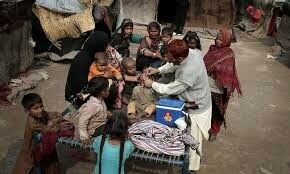ISLAMABAD, July 12: Environmental degradation is directly linked to poverty and lack of sustainable livelihood. Therefore, poverty alleviation is must to cope with increasing environmental problems in disaster-hit areas.
This was observed by speakers during a discussion, “Disaster watch” hosted by the Rural Development Policy Institute (RDPI) and Practical Action South Asia.
Representatives of the Earthquake Reconstruction and Rehabilitation Authority (Erra), Worldwide Fund for Nature (WWF) and the print media were among the panelists of the discussion. They said long-term rehabilitation of environment was not possible without serious efforts to alleviate poverty in the affected region.
They said institutionalisation of the reconstruction and rehabilitation process without having sufficient capacity in the relevant field could not be termed an efficient strategy. One of the participants said Erra had done more lip service than real work on the ground.
The earthquake-affected areas of NWFP have no economic opportunities. Neither there are any industry or traditional means of earning livelihood through home-based handicrafts nor packaging and processing of dry fruits is promoted in the quake-devastated region.
“When you do not have a policy for natural resource management, deforestation would be the logical outcome,” he remarked.
Dr Ejaz Ahmed of WWF explained the inter-relationship of ecology, environment and human habitat. He said forests were essential for stable land and predictable rain cycle. This in turn maintains underground water table; but fuel is equally essential for human survival. The answer lied in appropriate, echo friendly and human development.
He said environmental issues and problems of unemployment in the earthquake-affected region can be resolved through integrated and livelihood-centred approaches to disaster management. “The solution can be found in the intelligent use of traditional skills and ensuring a direct link of these products to the market without exploitative role of the middlemen.”
Tariq Bhatti of RDPI deplored the lack of coordination among environment-related regulatory bodies and inefficient monitoring regimes thereof.
Farzana Altaf Shah, Erra’s programme manager environment, highlighted the negative contribution of irresponsible consumerism causing irreparable damage to non-replenishable sources of the earth. She clarified Erra’s policy and progress on rubble removal and recycling of debris without causing harm to the environment and sources of water.













































Dear visitor, the comments section is undergoing an overhaul and will return soon.